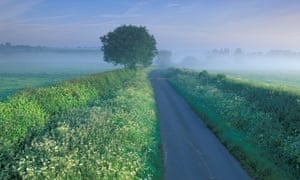The poisonous residue from car exhausts is causing a public health crisis – and could be the death of sparrows too
You may never have heard of cow parsley syndrome, yet it’s been visible over much of Britain for the past month – the spectacle of country roads fringed with a dense throng of tall white feathery flowers, three- to four-feet high, which many people now think of as an attractive addition to the landscape. It’s a pity they do, for the point about the syndrome is this: there’s lots of cow parsley, sure. But there isn’t anything else.
Along mile after mile of our rural highways, especially the closer you get to London, every spring you will see masses of this frothy foam. But what you often won’t find is the lovely variety of wildflowers that 30 to 40 years ago decorated these same roadside verges: comfrey, lady’s smock, garlic mustard, early purple orchid and many more. The cow parsley has largely crowded them out because it has been fertilised into excessive growth. Much of the fertiliser has come in the form of nitrogen compounds from car exhausts, especially diesel ones – a striking example of how air pollution from motor vehicles is impacting on the natural world.
We know only too well how it impacts on us. Causing up to 40,000 premature deaths a year, air pollution in Britain is now right at the top of our list of environmental health concerns. It is seen in human terms as a crisis and a public health emergency. Vehicle emissions are breaking EU air quality laws, and the government has had to be ordered by the supreme court to find an effective strategy.

We know only too well how it impacts on us. Causing up to 40,000 premature deaths a year, air pollution in Britain is now right at the top of our list of environmental health concerns. It is seen in human terms as a crisis and a public health emergency. Vehicle emissions are breaking EU air quality laws, and the government has had to be ordered by the supreme court to find an effective strategy.


No comments:
Post a Comment